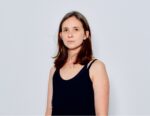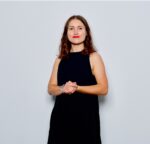Summary of the second WOK residency programme
Following the success of the first edition of the residency programme at the Warsaw Observatory of Culture (WOK) in 2023, we launched the second edition, the central assumptions of which remain unchanged. These are establishing close relationships with the residents, supporting them in their processes, and not imposing an obligation to produce a work or project. This time, however, the emphasis was on maintaining regular contact with the whole group in order to facilitate the exchange of ideas and experiences that could benefit our residents, including individual processes of the participants. Group and individual meetings alternated as two parallel processes during the residency. We listened carefully to the needs and ideas of the residents to find the best forms of development and support. Some of the ideas pursued by participants during the residency included a research trip to trace family memories, workshops on planning creative work, training in opening, running an association or foundation and much more. We did not focus on producing the final result but allowed our residents to experiment and try out different solutions without having to prove the validity of their choices.
A total of 186 applications were received for the second edition of the residency programme, including 148 applications from individuals, 38 from duos/collectives and 17 applications in English. The highest number of applications came from the visual arts, followed by theatre and performance arts, research and journalism, social activities and choreography. The fewest applications came from people working in film and literature.
The following people were selected through the two-stage application process:
Nina Boichenko – a researcher of migration processes, co-founder of the inter-university project Badacze i Badaczki na Granicy (Researchers on the Border). She said that she needed this residency to take a breather, put some of her projects on hold and take care of her mental health, in order to choose the best directions of work for her.
Stefan Bieńkowski – sociologist and artist who deals with precarious employment and care work. He used the residency as an opportunity to thoroughly review his activities, develop his passions and explore new ideas.
Anastazja Charitonowa – theatre researcher, educator, manager of theatre and museum projects. During her residency, she focused on the everyday needs necessary for her presence on the Polish market, cared for her health, rested and then started a new course of study.
Patrycja Drzazga – activist, visual artist, social activist, graphic designer, gardener, board member of the Common Good Studio and co-founder of the Motyka i Słońce community garden and the MOST cooperative. She needed time to organise her participation in the collective and systematise her work.
Monika Dubiel – psychologist, Spanish philologist and researcher on the accessibility of culture for people with disabilities in Poland. She spent her residency collecting research material and decided to use the grant to pay assistants who enabled her to attend plays, performances and other events she analysed.
Dorota Ogrodzka – artist and activist, theatre teacher, director and playwright, and vice-president of the Association of Theatre Teachers, used her residency as an opportunity to take a break from her busy schedule, make time for conversation and look after her health.
Paweł Knut – lawyer, researcher and essayist. As part of his residency, he began preparing to write a non-fiction feature story about the fate of Poles and Ukrainians caught up in the Second World War who started a new life in the so-called Recovered Territories.
Iza Szostak – choreographer, dancer, performer and co-founder of the Centrum w Ruchu collective. She treated the residency as an opportunity to acquire new skills that would ease the pressures of motherhood and provide a springboard from her current job. As a result, she trained in social media management and business plan writing, and then, together with her husband, started promoting and renting a holiday home in Samice.
Maria Halber / Aleksandra Kamińska / Agata Wnuk – the Girls and Queers to the Front collective, co-founded by: a poet, editor and book author; a researcher, doctor of cultural studies and member of the Gender/Sexuality Laboratory; a yoga teacher, DJ and zine maker, who saw the residency as an opportunity to develop a sustainable and feasible strategy for their work as a collective and publishing endeavours grow.
Sonia Jaszczyńska i Agnieszka Strzeżek – a duo of visual artists who collaborate at the intersection of art, curatorial and publishing, art education and research, who are also the co-founders of the zine publishing house Stopka and the Matki Twórczynie (Mothers Creators) group. As part of their residency, they took stock of their collaboration and decided to revise certain aspects of it, including the idea of formalising their activities.
Observing the processes and changes that took place as a result of the skills acquired and listening to the needs, intuitions, concerns and ideas of the residents was an incredibly interesting and vital experience for us. We felt that we were growing with them without disturbing the nature of that growth. We enjoyed the role of observers and facilitators of processes, which is quite unusual for a local government institution.
As part of the programme, WOK provided residents with a grant paid in four instalments – PLN 8,000 for individuals and PLN 10,000 for collectives – to cover basic needs during the residency, and an additional production budget of PLN 5,000 to cover, among other things, the fees of experts, including translators, or assistants with disabilities, coaching support, participation in selected workshops, as well as the purchase of books, payment for courses, materials and even travel expenses for a research trip. We have found that this type of support allows participants to develop in a variety of ways, without the pressure to benefit the institution. This has helped reduce the tensions associated with creative and research work, stimulate creativity and enthusiasm and regain the freedom to act and realise hidden ideas.
The summary evaluation of the second edition demonstrates that the WOK residency helped participants organise their thoughts, focus on themselves and their activities or projects. It was a source of inspiration and provided significant support in their daily work. The residents found the following aspects of the programme to be particularly important and beneficial, i.e. the opportunity to redefine their work and their approach to creativity, the financial support that allowed for more conscious management of time and resources, and our openness to the residents’ individual needs.
The residents described their experience of the second edition of the residency at WOK with the following keywords:
anchor
slit
an application running in the background
well-asked questions
exchange
care and support
breathing
relationship based on empathy and trust
that which does not fit into the system







